| SEMPER FIDELIS | |
| June 25, 1999 |
||

|
|
|
|
JIM LEHRER: General, welcome. GENERAL CHARLES KRULAK: Good to be here, Jim. JIM LEHRER: Sir, are you comfortable with the role the U.S. Marines are playing in Kovovo right now? GENERAL CHARLES KRULAK: Yes, I am. It's a tough role. I mean, the American people need to understand that. This is not going to be easy, they're involved in what I call the three-block war. At one point in time, one block, they've got a child in their hands, they're wrapping that child in swaddling clothes, they're feeding it, and it's called humanitarian assistance. The next moment, they're keeping two factions apart-- that's called peacekeeping. And what you're seeing is the third block, every once in a while coming into the second, and the third block in the three-block war is what we call mid-intensity, highly lethal conflict. And so right now, as an example, we have a Marine unit under fire by a sniper. To you and I, that might seem like nothing, but to that young Marine that's getting shot at, that's mid-intensity conflict, and he's into the third block. Trying to manage, the Marine or the army soldier, trying to manage to work through the three-block war is very difficult. |
||||||||||||||||||
| Gun battle in Kosovo. | |||||||||||||||||||
|
JIM LEHRER: Now, there have been two incidents. There's one now, the one that's going on.
JIM LEHRER: And according to the wires a while ago, one civilian has already been killed. GENERAL CHARLES KRULAK: That's correct. JIM LEHRER: In the earlier incident, also, a Serb civilian was killed by U.S. Marines. GENERAL CHARLES KRULAK: Not, not civilians. JIM LEHRER: Okay. All right. GENERAL CHARLES KRULAK: A big difference between somebody who's shooting at you -- JIM LEHRER: Right, somebody with a gun, absolutely. GENERAL CHARLES KRULAK: You and I know that's not a civilian. JIM LEHRER: Absolutely right. Somebody with a gun who was shooting at a Marine, a Marine shot back. GENERAL CHARLES KRULAK: That's right. JIM LEHRER: Are you satisfied that those casualties could not be avoided? GENERAL CHARLES KRULAK: Yes, absolutely. Whether he's a Marine or a soldier, that's the son of a mother and father that is an American, and we're not going to allow our sons or our daughters to be fired at without retaliating, and the quicker we do it, believe me, the more the bad guys, so to speak, are going to take it to heart that you do not fool with the American serviceman, in this case the Marine, and if you ever let them think that they can get away with shooting at the sons and daughters of our American mothers and fathers, we're in real trouble. JIM LEHRER: Are U.S. Marines trained to do these three very different, delicate kind of jobs? GENERAL CHARLES KRULAK: That's exactly what we've been involved with over the past years. We have been working diligently to ensure that we can fight the three-block war, because we believe in our heart and souls that that is the conflict of the 21st century. So to answer your question, yes. It's hard, though. It's hard.
GENERAL CHARLES KRULAK: That's correct. JIM LEHRER: Somebody shoots at you; you shoot back, and you move on. GENERAL CHARLES KRULAK: That's correct, and if you can imagine taking, oh, one of the young men and women of character from our American society and saying, "Look, at one time you're going to have to be taking care of a child, and then the next moment you're going to be involved in mid- intensity conflict," it really takes a special type of person. That's why we've changed our recruiting standards. That's why we've changed and increased the time in boot camp and made it tougher, because we understand that what we're looking at now is somebody that we call the strategic corporal: The individual who at the very lowest level of the Marine Corps is going to have to deal with issues of strategic importance. JIM LEHRER: And they can do it? GENERAL CHARLES KRULAK: They can do it. We're seeing it right now. I mean, we're seeing the evidence of that right now. They are moving from one block to the other, seamlessly. Is it easy? No. Is it dangerous? Very dangerous. Are they doing it? Yes. JIM LEHRER: Is this something that the American people as well as the U.S. Military and the Marines in particular better get used to because this is what the future is, in terms of the use of the U.S. Military?
JIM LEHRER: Did you think that bombing alone would produce the result it did in Kosovo? GENERAL CHARLES KRULAK: No, not really. I don't think bombing alone did produce it. I think what produced the results that we saw were the bombing, which was done magnificently by the Air Force, by the Navy, and by the Marine Corps, as well as the threat of ground attack and the actual movement of ground forces-- in this case, the KLA-- that I think flushed the Serbs and certainly sent a signal to Milosevic that we were ready to come, and at that point in time he said, "I'm going to cut my losses and cut the best deal I can." JIM LEHRER: Did you question this strategy from the beginning, whether or not this was really the way to do this? |
|||||||||||||||||||
| Strategy in Kosovo. | |||||||||||||||||||
|
JIM LEHRER: But the additional part of that is what do we as Americans want to -- how do we as Americans want to exercise our military power? GENERAL CHARLES KRULAK: Yes, sir. JIM LEHRER: Has there been that public debate, and why hasn't there been? GENERAL CHARLES KRULAK: There hasn't been. I'm not sure why. The reality is, a nation is a superpower not just because of its military strength; a nation is a superpower because of five, what I call elements of national power. One of them is the diplomatic. One is military. One is our industrial might, the strength of the industry of the nation. The fourth one is the laboratories and the academic environment that can also be brought to bear as part of the element of national power. And the fifth, and gaining more importance all the time, is the information element of national power. This country right now is disposed to use diplomacy and the military, and we seem to be forgetting that we have three other very powerful tools that make us a superpower. Conoco Oil, University of Pennsylvania, this TV station also are elements of the power of this great country of ours, and we need to learn how to use them.
GENERAL CHARLES KRULAK: First off, I don't think that the President thought he was fighting a risk-free war, and certainly my Marine pilots never felt it was risk-free. I mean, if they're shooting ground-to-air missiles at you, that's not risk-free. I think what the President was trying to do, and did it fairly successfully, was to bring this tyrant to his knees without placing a whole lot of U.S. servicemen and women at risk. And it took a long time, it took many, many days, but you can't argue with what happened. The problem is, it isn't over. JIM LEHRER: Yes. But it's legitimate. It's a legitimate idea to try to fight a war like this, where the number of casualties is an overriding concern, rather the end result? GENERAL CHARLES KRULAK: If you have a situation where we found ourselves in, which was the debate had not taken place, the issue of vital national interests had not taken place, and at that point in time, we fought a war that was basically as clean as it could be. JIM LEHRER: Speaking of the public and debate, et cetera, a lot of people have been talking recently about a growing gap between the culture of the United States Marine Corps and the military, and rest of American society. Is there such a gap?
JIM LEHRER: Let me read you what Thomas Ricks wrote in the "Atlantic Monthly." He wrote a book you might know about. GENERAL CHARLES KRULAK: Sure. JIM LEHRER: He followed a recruit platoon through Parris Island, and he wrote an article in "Atlantic Monthly," and he said, "I was stunned to see, when they went home for post-graduation leave--" these are the Marine recruits-- "how alienated they felt from their old lives. At various times, each of these new Marines seemed to experience a moment of private loathing for public America. They were repulsed by the physical unfitness of civilians, by the uncouth behavior they witnessed, and by what they saw as pervasive selfishness and consumerism." What do you think of that? GENERAL CHARLES KRULAK: I think that's a little hard on my friends in the American public, but I will say this much: I think that what you're seeing there is this inculcation of core values on this young, impressionable Marine. And so they come out of boot camp-- he's talking about people that just graduated from recruit training, having gone through the Crucible, having gone through this -- JIM LEHRER: Explain "the Crucible." |
|||||||||||||||||||
| Marine Corps boot camp. | |||||||||||||||||||
|
JIM LEHRER: I know you've talked about the Littleton, Colorado, thing. GENERAL CHARLES KRULAK: Yes. JIM LEHRER: You wrote about it recently in the Richmond newspaper, about the cultural problems this country has. What -- draw the distinctions. What do you see when you look out? In other words, forget these new young Marines - as a commandant of the Marine Corps, a man who's been in the Marine Corps 35 years -- when you look out at civilian society today and relate that to the violence that manifested itself in these school shootings. GENERAL CHARLES KRULAK: Well, first off, I think that the mothers and fathers of America are trying their level best to raise young men and women of character. There's not a mother out there or a father out there that wants to raise a bum or a bum-ette. I don't think the schools are trying to produce bad kids, and I don't think the churches are. What I do believe is that they are in competition with a lot of garbage that's coming through movies, TV, books, you name it, and the kid is forced to deal with this. You and I didn't have to deal with it, believe me, and until we come to grips with that and understand what these young men and women want is a challenge. They want to be held accountable, they want to have a role model to look up to, and when they do, they will emulate that role model. If it's a positive role model, that's good; if it's a negative one, that's bad. What we as a nation have got to do is start putting in front of these kids some positive role models. JIM LEHRER: General, finally, we're about to go into a Presidential election campaign. GENERAL CHARLES KRULAK: Yes. JIM LEHRER: Should the candidates be talking about the kinds of things we've been talking about just now?
JIM LEHRER: General, you're about to retire? GENERAL CHARLES KRULAK: Yes, I am. JIM LEHRER: What are you going to do? After -- you were -- you've been in the Marines 35 years yourself. Your father, of course, was a three-star general before you. You've been a Marine all your life. GENERAL CHARLES KRULAK: I want to go surf, and after I surf for a couple of days, then I'm going to go to work with an organization up in Wilmington, Delaware, that also is a values-based organization. JIM LEHRER: All right. Well, semper fi, and thank you, and good luck to you, sir. GENERAL CHARLES KRULAK: Thank you. God bless you. |
|||||||||||||||||||
 JIM
LEHRER: Finally tonight, a conversation with the Commandant of the Marine
Corps, General Charles Krulak. He steps down next week after 35 years
in the Marines, four years as commandant. I spoke with him this afternoon.
JIM
LEHRER: Finally tonight, a conversation with the Commandant of the Marine
Corps, General Charles Krulak. He steps down next week after 35 years
in the Marines, four years as commandant. I spoke with him this afternoon.
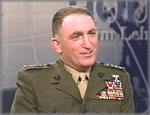 GENERAL
CHARLES KRULAK: Yes.
GENERAL
CHARLES KRULAK: Yes. 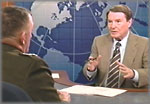 JIM
LEHRER: Because doesn't it require different skills? I mean, the warrior--
the third block, is the warrior.
JIM
LEHRER: Because doesn't it require different skills? I mean, the warrior--
the third block, is the warrior. 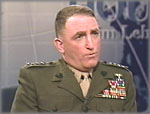 GENERAL
CHARLES KRULAK: I believe that, yes, and I think that the American people
need to understand that, and that we as a nation need to understand
that as we look at what are our vital interests and what aren't our
vital interests, and understanding that whatever our interests are going
to be, it is going to eventually lead us into what we call the three-
block war. Why? Because they've watched CNN, the enemy has. They've
seen the might of our technology. They're not going to fight us straight
up. We're not going to see the son of Desert Storm anymore. You're going
to see the stepchild of Chechnya. You're seeing it right now. It's called
Kosovo. Our enemies will attack us asymmetrically. They will take us
where we're weak, and they will negate our strengths, which is our technology,
and so the best way to do that is to get you into close terrain-- towns,
cities, urban slums, forests, jungles.
GENERAL
CHARLES KRULAK: I believe that, yes, and I think that the American people
need to understand that, and that we as a nation need to understand
that as we look at what are our vital interests and what aren't our
vital interests, and understanding that whatever our interests are going
to be, it is going to eventually lead us into what we call the three-
block war. Why? Because they've watched CNN, the enemy has. They've
seen the might of our technology. They're not going to fight us straight
up. We're not going to see the son of Desert Storm anymore. You're going
to see the stepchild of Chechnya. You're seeing it right now. It's called
Kosovo. Our enemies will attack us asymmetrically. They will take us
where we're weak, and they will negate our strengths, which is our technology,
and so the best way to do that is to get you into close terrain-- towns,
cities, urban slums, forests, jungles. 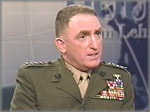 GENERAL
CHARLES KRULAK: I -- I questioned not the strategy, because it wasn't
a strategy, and that was the whole point of my comments. I did not believe
we were at the strategic level. We were talking about the tactical and
operational level of war: Should we drop bombs, should we not drop bombs,
should we put in forces, should we not? And I kept on wondering, where
is the debate about what the end state is -- not necessarily three years
from now, but what about ten years from now? And what are the measures
of effectiveness that we can have to get to that end state, and where
is the debate, the public debate, on the issue? And so those were my
concerns, and I ink I still have them, that sooner or later we need
to understand that we're talking about Central Europe, we're talking
about the Balkans. And you cannot just look at one country in the Balkans.
You have to look at the total Balkan picture and say, "What is
it that we want Europe to look like and be like ten to fifteen years
from now?"
GENERAL
CHARLES KRULAK: I -- I questioned not the strategy, because it wasn't
a strategy, and that was the whole point of my comments. I did not believe
we were at the strategic level. We were talking about the tactical and
operational level of war: Should we drop bombs, should we not drop bombs,
should we put in forces, should we not? And I kept on wondering, where
is the debate about what the end state is -- not necessarily three years
from now, but what about ten years from now? And what are the measures
of effectiveness that we can have to get to that end state, and where
is the debate, the public debate, on the issue? And so those were my
concerns, and I ink I still have them, that sooner or later we need
to understand that we're talking about Central Europe, we're talking
about the Balkans. And you cannot just look at one country in the Balkans.
You have to look at the total Balkan picture and say, "What is
it that we want Europe to look like and be like ten to fifteen years
from now?"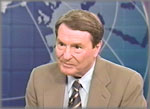 JIM
LEHRER: President Clinton took some heat from many people over the fact
that he was trying to fight a "risk-free war" in Kosovo, by
bombing from 15,000 feet, et cetera. What do you -- how do you read
that? What do you think about that kind of -
JIM
LEHRER: President Clinton took some heat from many people over the fact
that he was trying to fight a "risk-free war" in Kosovo, by
bombing from 15,000 feet, et cetera. What do you -- how do you read
that? What do you think about that kind of -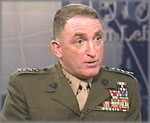 GENERAL
CHARLES KRULAK: I really don't believe it. I -- when I look at the core
values of the United States Marine Corps-- honor, courage, and commitment--
I believe in my heart and soul that those are the same values of the
mothers and fathers of America. I mean, I don't think there's a disconnect.
I think that there probably is a cultural gap that is recognizable but
good. In other words, to me, my responsibility to the American people
is to maintain higher standards. They don't want a Marine Corps that
has lowered their standards. They look to us as a breed apart, and so
if you talk about a difference in culture between the Marine Corps and
American people, that may not be bad. That's probably good, and that's
what the American people want.
GENERAL
CHARLES KRULAK: I really don't believe it. I -- when I look at the core
values of the United States Marine Corps-- honor, courage, and commitment--
I believe in my heart and soul that those are the same values of the
mothers and fathers of America. I mean, I don't think there's a disconnect.
I think that there probably is a cultural gap that is recognizable but
good. In other words, to me, my responsibility to the American people
is to maintain higher standards. They don't want a Marine Corps that
has lowered their standards. They look to us as a breed apart, and so
if you talk about a difference in culture between the Marine Corps and
American people, that may not be bad. That's probably good, and that's
what the American people want.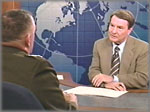 GENERAL
CHARLES KRULAK: The Crucible is the defining moment of boot camp. It's
a gut check. It's 54 straight hours of food and sleep deprivation, exacerbated
by 29 challenges that the recruits have to go through. It is an effort
to go from self-discipline to selflessness. We understand you can't
change the values of an 18-year-old, so what we've done is, we've said,
"Okay, what are the values that our Constitution talks about?"
Honor, courage, physical and more, and commitment -- and we put those
values on top of our Marines, and we stick them into the Crucible, and
they come out hard as steel. Now, they go home, and they're looking
at their neighborhood, and in that neighborhood there are people selling
drugs, people taking drugs, people beating their spouses, and that repulses
them. Why? Because they've just gone through this defining moment that
says, "This is bad, and people who do bad should be held accountable."
GENERAL
CHARLES KRULAK: The Crucible is the defining moment of boot camp. It's
a gut check. It's 54 straight hours of food and sleep deprivation, exacerbated
by 29 challenges that the recruits have to go through. It is an effort
to go from self-discipline to selflessness. We understand you can't
change the values of an 18-year-old, so what we've done is, we've said,
"Okay, what are the values that our Constitution talks about?"
Honor, courage, physical and more, and commitment -- and we put those
values on top of our Marines, and we stick them into the Crucible, and
they come out hard as steel. Now, they go home, and they're looking
at their neighborhood, and in that neighborhood there are people selling
drugs, people taking drugs, people beating their spouses, and that repulses
them. Why? Because they've just gone through this defining moment that
says, "This is bad, and people who do bad should be held accountable."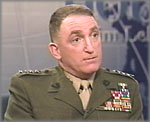 GENERAL
CHARLES KRULAK: If I were a candidate, two things that I'd talk about
immediately. One of them is education, and I don't mean getting new
schools and getting new books. I'm talking about paying a teacher to
do the job of saving lives. We pay a doctor a lot of money. Why? Because
they save lives. Well, let me tell you, those kids are the lifeblood
of this nation, and yet probably the poorest people around is the secondary
school teacher, and as soon as this nation wakes up to the fact that
we need to start paying what I call the doctors of education-- that's
the schoolteacher-- a sufficient amount of money to do the job, the
better off we're going to be. The second area has to do with national
security and what it is to be a superpower, and I go back to the five
elements of national power. We need to understand that there are not
just two, there are five of them, and how do we as a nation employ them
and be the superpower for good that we can be?
GENERAL
CHARLES KRULAK: If I were a candidate, two things that I'd talk about
immediately. One of them is education, and I don't mean getting new
schools and getting new books. I'm talking about paying a teacher to
do the job of saving lives. We pay a doctor a lot of money. Why? Because
they save lives. Well, let me tell you, those kids are the lifeblood
of this nation, and yet probably the poorest people around is the secondary
school teacher, and as soon as this nation wakes up to the fact that
we need to start paying what I call the doctors of education-- that's
the schoolteacher-- a sufficient amount of money to do the job, the
better off we're going to be. The second area has to do with national
security and what it is to be a superpower, and I go back to the five
elements of national power. We need to understand that there are not
just two, there are five of them, and how do we as a nation employ them
and be the superpower for good that we can be?